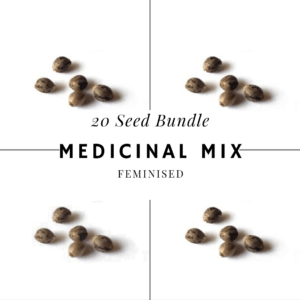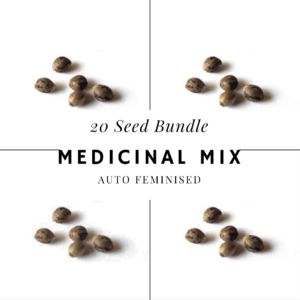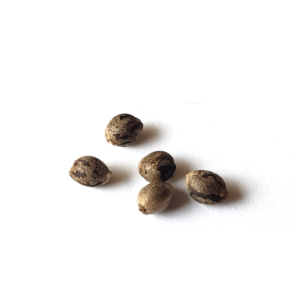Welcome to the world of Medicinal Cannabis in Australia! An exciting and evolving landscape, with potential therapeutic applications that might just change the face of medicine as we know it.
Key Takeaways
Medicinal cannabis in Australia is legal but requires a doctor’s prescription and is not subsidized by the government, involving cannabinoids like THC and CBD for therapeutic use.
Potential therapeutic applications for medicinal cannabis in Australia include chronic pain, epilepsy, anxiety, PTSD, certain cancers, and symptoms of diseases like multiple sclerosis and Crohn’s disease, although effectiveness varies.
Accessing medicinal cannabis in Australia is a regulated process with specific government approvals needed; it comes in various forms like oils, capsules, and dried flowers, and patients should be aware of possible side effects and drug interactions.
Understanding Medicinal Cannabis in Australia

For many in Australia, cannabis is more than a plant; it holds the potential to change lives. Medicinal cannabis, essentially pharmaceutical preparations derived from the cannabis plant, is being used to treat a variety of medical conditions. However, obtaining it isn’t as straightforward as making a regular store purchase. A doctor needs to prescribe it, ensuring it is a suitable treatment for the patient’s condition.
Current research exploring the therapeutic effects of cannabis and cannabinoids continues to progress. Yet, the initial findings are promising, suggesting considerable benefits in managing chronic pain not related to cancer, along with other conditions such as epilepsy and anxiety.
What are medicinal cannabinoids?
Cannabinoids are compounds found in the cannabis plant, like THC and CBD, that are used for therapeutic purposes. Unlike recreational cannabis, medicinal cannabinoids are prescribed by doctors for specific conditions. THC, also known as delta-9 tetrahydrocannabinol, is the component that can make you feel “high”, while CBD, or cannabidiol, doesn’t have this effect. The combination of these cannabinoids is usually prescribed to achieve the desired therapeutic effect.
However, THC and CBD aren’t the only significant players. Other cannabinoids like cannabinol (CBN), THCV, and delta-8-THC are also present in legal medicinal cannabis products. And yes, scientists are exploring the potential benefits of these other cannabinoids too!.
Legal status in Australia
While medicinal cannabis is legal in Australia, it requires a doctor’s prescription. The Therapeutic Goods Administration (TGA) regulates the supply of medicinal cannabis. This regulation is important for ensuring safe and controlled access to this treatment. However, it’s not listed on the Pharmaceutical Benefits Scheme (PBS), which means it may not be subsidized by the government.
Pharmacists can only provide most medicinal cannabis products adhering strictly to prescription instructions, ensuring that unapproved medicinal cannabis products are not dispensed. Registered medicinal cannabis products have undergone the same regulatory process as other prescription medicines, ensuring the quality and safety of the medicinal cannabis product dispensed to patients.
The Medical Application of Cannabinoids
The potential therapeutic applications of medicinal cannabinoids are extensive. They include:
Treating epilepsy
Treating multiple sclerosis
Managing sleep disorders
Treating anxiety and PTSD
Treating certain cancers
Managing appetite loss
Treating inflammatory bowel diseases
These applications are backed by robust clinical trials and ongoing research, making medical cannabis a promising treatment option for various conditions, including those that benefit from medicinal cannabis and medical marijuana.
It’s important, however, to keep in mind that the effectiveness may vary depending on the condition. For instance, cannabinoids have shown a modest effect on chronic pain, while the evidence for treating cancers, including glioma, is still insufficient.
Chronic pain management
Chronic pain management is one of the most common reasons patients turn to medicinal cannabis. An array of studies have demonstrated its effectiveness in managing chronic pain in adults.
Interestingly, the use of medicinal cannabis could lead to a decrease in opioid use among pain patients, providing an alternative way to manage pain and potentially helping to address the opioid crisis.
Epilepsy treatment
Epilepsy is a neurological disorder characterized by abnormal brain activity leading to seizures. The potential of medicinal cannabis, particularly in children with severe forms of epilepsy, is promising.
Both THC and CBD have been shown to prevent seizures in animal models. Nonetheless, it’s worth mentioning that approximately a third of people with epilepsy still experience seizures despite using antiepileptic medications.
Multiple sclerosis and spasticity
Multiple sclerosis is a long-term condition that can affect the brain and spinal cord, causing a wide range of potential symptoms. One of these symptoms, spasticity, can be managed with the help of cannabis.
Cannabinoids, specifically nabiximols, have shown effectiveness in alleviating spasticity in patients with multiple sclerosis. Patients have reported improvements in spasticity rating compared to a placebo, marking a significant breakthrough in symptom management.
Sleep disorders
Sleep disorders can be debilitating, significantly impacting a person’s quality of life. Cannabinoids, specifically Nabilone and CBD, have shown promise in improving sleep disorders.
Notably, cannabinoids can aid in improving sleep latency and slow-wave sleep. However, long-term use of THC can lead to tolerance and potential sleep disturbances upon cessation.
Anxiety disorders
Anxiety disorders can be crippling, often requiring long-term management strategies. The role of the endocannabinoid system in mood regulation suggests potential benefits of cannabinoids for anxiety disorders.
Clinical evidence has shown short-term benefits of cannabinoids in self-reported anxiety symptoms. For instance, cannabidiol was associated with improved outcomes during a simulated public speaking test for patients with generalized social anxiety disorder.
Post-traumatic stress disorder (PTSD)
PTSD is a mental health condition triggered by a terrifying event. Recent research suggests that medicinal cannabis can help manage PTSD symptoms. In particular, Nabilone has shown effectiveness in improving nightmares, overall clinical state, and general well-being more than a placebo. However, more research is needed to validate these findings.
Certain types of cancer (as a complement to other treatments)
The potential application of cannabinoids in the treatment of certain types of cancer is a hot topic of research. In vivo studies have found an antitumor effect of cannabinoids, suggesting a potential role in regulating cancer processes.
Nonetheless, it’s worth highlighting that cannabinoids aren’t a standalone cancer treatment, but they can potentially complement other cancer treatments.
Appetite loss and anorexia related to chronic illnesses such as HIV/AIDS
Appetite loss, anorexia, and nausea and vomiting can be side effects of chronic illnesses like HIV/AIDS. Medicinal cannabis, particularly dronabinol, has been used to treat anorexia in AIDS patients experiencing weight loss.
Yet, the supportive evidence for the use of cannabis and cannabinoids in treating AIDS-related anorexia is limited, with its effectiveness and safety not yet validated.
Symptoms related to inflammatory bowel diseases like Crohn’s disease
Inflammatory bowel diseases, such as Crohn’s disease, can cause debilitating symptoms. Cannabinoids have the potential to relieve symptoms associated with these diseases, helping manage conditions like abdominal pain and diarrhea.
Still, further research is required to comprehensively determine the effectiveness of cannabinoids and their influence on the underlying inflammatory processes in inflammatory bowel diseases.
Accessing Medicinal Cannabis in Australia
Obtaining medicinal cannabis in Australia involves a regulated process that necessitates a doctor’s prescription along with requisite government approvals. So, it’s not as straightforward as picking it off a shelf in a pharmacy.
The prescription process is handled by medical practitioners who evaluate whether medicinal cannabis is suitable for the patient’s condition. They also arrange the required approvals for medicinal cannabis.
Doctor’s approval and prescription
The journey to acquire medicinal cannabis starts with a doctor’s endorsement and prescription. Any registered medical practitioner or nurse practitioner can prescribe medicinal cannabis to any patient with any medical condition.
If the doctor believes it’s right for you, they can apply to the TGA for authorization to prescribe certain medicinal cannabis products without having to seek approval for each prescription.
Government approvals
Government approvals are crucial for accessing medicinal cannabis. The TGA oversees the supply of medicinal cannabis in Australia, guaranteeing the products adhere to standards of quality, safety, and efficacy.
To get TGA approval, you have to either notify or apply to the TGA for approval through the Special Access Scheme (SAS) or Authorised Prescriber pathway. Once all necessary information is provided, approvals are usually processed within 2 working days.
Types of Medicinal Cannabis Products Available

A wide variety of medicinal cannabis products are accessible to patients in Australia, catering to an array of preferences and needs. These include tablets, oils, tinctures, and other extracts, all of which are forms of a medicinal cannabis product.
Each product type has its unique attributes that make it suitable for different purposes and methods of administration. Let’s delve deeper into the most common types of medicinal cannabis products: oils and tinctures, pills and capsules, and dried flowers.
Oils and tinctures
Oils and tinctures are liquid forms of medicinal cannabis. They are made by extracting the active compounds from the cannabis plant and mixing them with a carrier liquid such as coconut or olive oil.
These liquid forms are usually taken by placing them under the tongue, allowing for direct absorption into the bloodstream. They have been reported to help with conditions like:
arthritis-related pain
other types of pain
anxiety
depression
Pills and capsules
Pills and capsules provide a convenient method for oral administration of medicinal cannabis. They are filled with cannabis extract diluted in a food-grade oil.
The dosages vary, and it is crucial to discuss with a healthcare professional to determine the right dosage for individual needs. The effects of medicinal cannabis pills and capsules usually kick in within 30 minutes to 1 hour after intake.
Dried flowers
Dried flowers are another form of medicinal cannabis. They can be vaporized and inhaled, which is considered safer than smoking and delivers a more potent dose. To vaporize properly, you would need a TGA-approved dry-herb vaporizer and the correct temperature settings. However, inhaling vaporized medicinal cannabis dried flowers could cause potential risks like acute toxic emissions and respiratory symptoms such as dry cough.
Potential Side Effects and Risks
As with any medication, medicinal cannabis also presents potential side effects and risks. These can include:
Feeling tired
Feeling dizzy
Feeling nauseous
Experiencing anxiety
Experiencing paranoia
These side effects are more common with THC-containing products. It is important to consult with a healthcare professional before using medicinal cannabis.
In addition, while rare, severe adverse events may transpire. These include issues related to driving, cognitive impairment, and drug dependence.
Adverse events
Potential adverse events linked to the use of medicinal cannabis can raise concerns. Particularly, products containing THC can cause:
Dry mouth
Dizziness
Sedation
Dysphoria
Decreased physical function
To mitigate these, it’s best to use CBD-predominant types during the day, start with a small dose and slowly increase it, and use validated tools to screen and assess patients.
Drug interactions
Interactions between medicinal cannabis and other medications can potentially alter their effectiveness or induce toxicity. It can impact how well other medications work by interfering with the enzymes that break down drugs in the body.
Some medications known to interact negatively with medicinal cannabis include:
Sympathomimetics
Central nervous system depressants
Warfarin
Tacrolimus
Methadone
Tamoxifen
Ketoconazole
Rifampin
Sulfamethoxazole
Carbamazepine
N-desmethylclobazam
Driving and Medicinal Cannabis Use
Operating a vehicle post using medicinal cannabis, especially those containing THC, can impact abilities and heighten accident risks. In Australia, it’s illegal to drive with any amount of THC in your system, even if it’s from medicinal cannabis.
Oral THC products can impair driving skills and heighten accident risks for approximately 8 hours after consumption. It’s crucial to be aware of these risks before deciding to drive.
Growing Your Own Medicinal Cannabis in Australia
In most parts of Australia, cultivating personal medicinal cannabis is currently illegal, with the exception of the Australian Capital Territory (ACT). In the ACT, residents can have up to 50 grams of dry cannabis or 150 grams of wet cannabis, and they’re allowed to grow up to two cannabis plants per person or a maximum of four plants per household. However, even though cannabis is decriminalized in the ACT, it’s still federally illegal.
Costs and Subsidies for Medicinal Cannabis
For many patients, the cost of medicinal cannabis in Australia is a substantial factor to consider. Unfortunately, the Australian government doesn’t currently subsidize medicinal cannabis products, and patients must bear the full cost of their treatment.
The average cost of medicinal cannabis in Australia can range from $50 to $1000 per patient per week. The cost varies depending on individual needs, treatment format, dosage requirements, and brand.
Clinical Trials and Ongoing Research
Clinical trials along with ongoing research play a pivotal role in comprehending the potential benefits and uses of medicinal cannabis for a range of medical conditions. In Australia, several clinical trials are exploring the use of medicinal cannabis in:
Chronic pain
Anxiety
PTSD
Other conditions
To further understand its implications, it is essential to discuss medicinal cannabis with healthcare professionals and researchers.
Patients have the opportunity to participate in these trials, thereby contributing to the expanding knowledge base on medicinal cannabis. However, it’s important to note that the guidance for doctors prescribing medicinal cannabis is still general, and it’s left to doctors to use their judgment and consider the patient’s situation and available evidence.
Summary
We’ve explored the world of medicinal cannabis in Australia, examining its potential therapeutic uses, legal aspects, and ongoing research. The landscape is rapidly evolving, and as more research emerges, we’re likely to see a better understanding of the full potential of medicinal cannabis. It’s an exciting time in the realm of medicine, and medicinal cannabis is undoubtedly playing a significant role in shaping the future of healthcare.
Frequently Asked Questions
Is cannabinoid oil legal in Australia?
No, cannabinoid oil is not legal in Australia for direct sale without a prescription. Only hemp seed products containing minimal CBD are allowed to be sold without a prescription, but these contain insignificant amounts of CBD.
Is Delta 9 legal in Australia?
No, Delta 9 is not legal in Australia due to specific regulations and its status as a controlled substance. Make sure to stay informed about the current regulations to avoid any legal issues.
How can cannabinoids be used as medicine?
Cannabinoids can be used as medicine to treat conditions such as epilepsy, multiple sclerosis, and symptoms associated with cancer and its treatment. They have shown promising evidence in providing relief for these conditions.
What do cannabinoids do to the body?
Cannabinoids can help reduce chronic pain and relieve spasticity in conditions like multiple sclerosis. They also regulate various bodily functions and can affect mood, appetite, and pain perception.
What are the applications of cannabinoids?
Cannabinoids have various applications, including relief from conditions such as spasticity in multiple sclerosis, chronic pain, epilepsy, schizophrenia, and nausea and vomiting in cancer patients. They are also used for their anti-inflammatory and relaxing properties.










